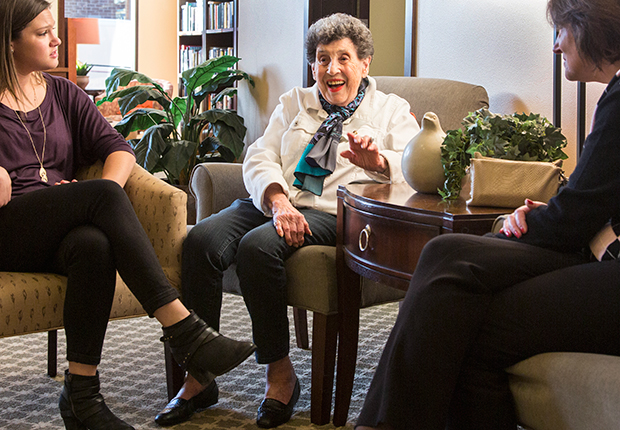AARP Eye Center

By Vanessa Ho
Life improved dramatically for Barbara Flagg about a year ago, when her son-in-law bought her a pair of hearing aids—a $3,000 investment Flagg couldn’t afford herself.
Suddenly, she could hear her friends in a noisy dining room. She could follow the conversation at the senior council meetings she attended. Best of all, she could connect with her children and grandchildren.
“Even if they were talking about football or baseball or ... concerts, I was part of the conversation and it made me feel better,” said Flagg, 90, of Kirkland. “It felt like I was younger again.”
A recent federal study found that nearly half of all Americans over 60 have hearing loss and that the high cost of hearing aids—on average, more than $2,300 per device—makes treating hearing loss difficult for many people not as lucky as Flagg.
To help more people, AARP Washington is making the reinstatement of Medicaid funding for hearing aids a top priority this year. Other goals for the 2017 state legislative session, which begins this month, include looking at ways for residents to pay for long-term care needs, strengthening elder abuse laws and monitoring guardianships.
More than half of the states cover hearing aids under Medicaid, but Washington discontinued coverage of the devices for adults in 2011. Childen are still covered. Most private insurance plans also do not cover hearing aids.
“Hearing aids are unaffordable for a growing population of low- and middle-income seniors,” said Cathy MacCaul, advocacy director of AARP Washington. “People’s inability to hear exacerbates other kinds of issues they may have in terms of loneliness, dementia or depression.”
An estimated 650,000 Washington residents have some form of hearing loss. “More work needs to be done to understand the fiscal impact, but funding hearing aids for the most vulnerable adults should be a priority,” MacCaul said.
Other legislative priorities
AARP Washington also wants a cost-of-living increase in the personal-needs allowance of residents in state-financed long-term care. Currently, residents on Social Security in nursing homes, hospice centers and residential habilitation centers can use up to $57.28 of their state income as a monthly allowance for clothing, toiletries and other items.
That amount has been frozen since 2008. The proposed cost-of-living increase would not be retroactive, so any increase this year and its impact on the state budget would be minimal, MacCaul said. “This basically lifts the freeze from 2008 and gives us a piece of legislation moving forward.”
The organization will also support an expected bill to create tougher penalties and a longer statute of limitations in certain elder abuse and financial exploitation cases. The legislation will likely propose a new felony called theft from a vulnerable adult, in which someone gains control of a victim’s finances to steal from them.
“Cases of elder neglect and financial exploitation are on the rise,” MacCaul said.
AARP Washington will also work toward preventing abuse in the system of court-appointed guardians who manage the affairs of incapacitated adults. MacCaul said loopholes and lack of clarity in the complex system give guardians unchecked authority, leading to financial abuse and isolation from loved ones.
“It’s very difficult in the state to remove a guardianship, but often very easy for individuals to get guardianships or durable powers of attorney,” she said. Washington has 21,000 registered guardians.
Vanessa Ho is a writer living in Seattle.































































